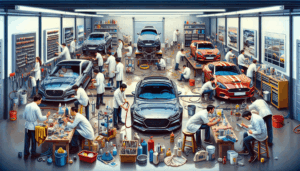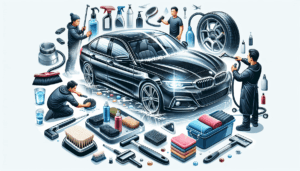If you’re considering getting your car detailed, it’s important to weigh the pros and cons before making a decision. While car detailing can undoubtedly enhance the appearance of your vehicle and make you feel proud as you drive down the road, it’s essential to acknowledge that there can be some disadvantages to this service. One of the main drawbacks is the cost, as car detailing can be quite expensive depending on the level of service you choose. Additionally, it can be time-consuming, especially if you have a busy schedule. Finally, if you rely on your car for daily transportation, you may need to find alternative arrangements while it’s being detailed. Despite these disadvantages, many car owners find that the benefits outweigh the drawbacks, ultimately leading to a better driving experience.

Time-consuming process
Car detailing can take several hours or even days to complete
Car detailing is a meticulous process that involves cleaning and restoring every nook and cranny of a car. From the exterior to the interior, detailers focus on removing dirt, grime, and imperfections to achieve a pristine finish. However, this level of attention to detail can be time-consuming. Depending on the size of the vehicle and the extent of the detailing required, the process can take several hours or even days to complete. This can be a significant drawback for individuals with busy schedules who may not have the luxury of devoting a substantial amount of time to car detailing.
Detailing every nook and cranny of a car requires meticulous attention to detail
One of the reasons why car detailing is so time-consuming is because it involves paying meticulous attention to detail. Detailers need to clean and treat every surface, from the smallest crevices to the largest panels. This level of thoroughness ensures that no dirt or imperfections are left behind, resulting in a truly clean and polished finish. While this attention to detail is essential for achieving optimal results, it also contributes to the time-consuming nature of the process.
Time spent on car detailing may not be practical for people with busy schedules
Unfortunately, the extensive amount of time required for car detailing may not be practical for individuals with busy schedules. Juggling work, family, and other commitments can leave very little time for tasks such as car detailing. While keeping your car clean and well-maintained is important, sometimes it may be difficult to find the time to do so. This is why many people opt for professional detailing services, as they can save time and still enjoy the benefits of a beautifully detailed vehicle.
Costly
Extensive car detailing services can be expensive
Another disadvantage of car detailing is the cost associated with it. Extensive detailing services, especially those provided by professional detailers, can be quite expensive. The level of work and the use of high-quality products and equipment contribute to the cost. Detailers invest in specialized tools, cleaners, polishes, and waxes to ensure that they deliver exceptional results. As a result, the cost of their services can add up, making car detailing a financial commitment.
Professional detailing products and equipment can also add to the cost
In addition to the cost of professional detailing services, the products and equipment used can also increase the overall expense. Professional detailers typically use top-of-the-line products and equipment that are specifically designed for optimal results. These products and equipment often come with a higher price tag compared to ordinary household cleaning supplies. While the quality of these products can deliver superior results, it does come at a cost.
Regular car detailing can become a financial burden in the long run
Moreover, car detailing is not a one-time expense. To maintain the desired level of cleanliness and shine, regular detailing is necessary. This means that the costs of detailing can quickly add up over time, becoming a financial burden for some individuals. It is important to consider this recurring expense when deciding on the frequency of detailing and whether it aligns with your budget.
Risk of damage
Aggressive polishing or buffing can cause paint damage
While car detailing aims to enhance the appearance of a vehicle, there is a risk of causing unintended damage. Aggressive polishing or buffing, when done incorrectly or excessively, can lead to paint damage. Over time, this can result in swirl marks, scratches, or even the removal of the clear coat. It is crucial for detailers to use the appropriate techniques and products to minimize the risk of causing harm to the car’s paintwork.
Inexperienced detailers may inadvertently scratch or chip the car’s surface
Inexperienced detailers who lack the necessary skills and knowledge may inadvertently scratch or chip the car’s surface during the detailing process. This can happen when using improper tools or techniques, or when applying too much pressure. It is important to choose a reputable and experienced detailer who understands the intricacies of car detailing to minimize the risk of damage to your vehicle.
The use of improper cleaning agents or techniques can harm the car’s interior or exterior
Another potential risk of car detailing is the use of improper cleaning agents or techniques, which can harm the car’s interior or exterior surfaces. Using harsh chemicals or abrasive cleaners can cause discoloration, streaks, or even permanent damage to delicate materials such as leather or fabric. It is crucial for detailers to have a deep understanding of the appropriate cleaning agents and techniques for different surfaces in order to avoid any potential harm.
Time-consuming maintenance
Maintaining the results of car detailing requires regular upkeep
Once your car has been professionally detailed, it requires regular maintenance to preserve the results. Detailing is not a one-time solution, but rather an ongoing process to keep your vehicle in its best condition. Regular upkeep involves frequent washing, waxing, and polishing to maintain the cleanliness and shine. Without proper maintenance, the detailed finish can quickly diminish, making it necessary to invest more time and effort into re-detailing.
Frequent washing, waxing, and polishing are necessary to preserve the finish
To ensure the longevity of a detailed car, frequent washing, waxing, and polishing are necessary. Washing removes dirt and debris, while waxing and polishing protect and enhance the shine of the paintwork. These maintenance tasks require time and effort, as well as the use of appropriate products and techniques. Neglecting regular maintenance can lead to a loss of the car’s aesthetic appeal and undo the results of car detailing.
Failure to maintain the detailed car can result in a loss of its aesthetic appeal
If you choose not to prioritize the maintenance of your detailed car, you may notice a gradual loss of its aesthetic appeal. Without regular cleaning, washing, and protection, the car’s exterior can become dull, covered in dirt and grime, and prone to oxidation. Likewise, neglecting the interior can lead to stains, odors, and a general deterioration of the materials. By not properly maintaining your detailed car, you are essentially allowing it to revert to its previous condition, diminishing the time and effort invested in the initial detailing process.

Limited protection
Car detailing does not provide long-term protection against environmental factors
While car detailing can improve the appearance of a vehicle, it does not provide long-term protection against environmental factors. UV rays from the sun, bird droppings, tree sap, and other external elements can still damage the car’s surface, even after it has been detailed. The protective layers applied during detailing, such as wax or sealants, do wear off over time and need to be reapplied. Without additional protective measures, the detailed finish is susceptible to the same environmental factors as before.
UV rays, bird droppings, and other external elements can still damage the car’s surface
UV rays, bird droppings, and other external elements can all pose a threat to a detailed car’s surface. Exposure to sunlight can cause paint fading and oxidation, while bird droppings can be acidic and eat away at the paintwork. Other environmental factors such as tree sap, insects, and road debris can also cause damage if not promptly addressed. Car detailing alone cannot provide complete and long-lasting protection against these threats, necessitating additional measures to preserve the car’s appearance.
Additional protective measures like ceramic coatings may be required for extended protection
To achieve extended protection for a detailed car, additional measures such as ceramic coatings may be necessary. Ceramic coatings create a protective layer on the car’s surface that is highly resistant to UV rays, chemical stains, and small scratches. Unlike traditional wax or sealants, ceramic coatings can offer long-lasting protection, with some products claiming a lifespan of several years. However, it is important to note that ceramic coatings require professional application and can incur additional costs.
Environmental impact
Car detailing often involves the use of chemical cleaners and polishes
Car detailing typically involves the use of various chemical cleaners and polishes to achieve the desired results. These products are designed to be effective in removing dirt, stains, and imperfections from the car’s surfaces. However, these chemicals can have an impact on the environment, especially if not used or disposed of properly. It is important for detailers to choose eco-friendly products whenever possible and to follow best practices for their use and disposal.
Improper disposal of these chemicals can harm the environment
Improper disposal of the chemicals used in car detailing can have negative consequences for the environment. When these chemicals are washed away during the cleaning process or poured down drains without proper treatment, they can enter waterways and contaminate the environment. Chemicals such as detergents, degreasers, and solvents can be harmful to aquatic life and disrupt the balance of ecosystems. Detailers should be aware of the environmental impact of their activities and take steps to minimize their carbon footprint.
Excessive water usage during car detailing can contribute to water wastage
In addition to the use of chemical cleaners, car detailing often involves the use of water for washing and rinsing. While water is essential for cleaning, excessive water usage can contribute to water wastage, especially in regions with limited water resources. Detailers should aim to minimize water usage by utilizing methods such as waterless detailing or using pressure washers with water-efficient features. Water conservation is an important aspect of responsible car detailing and can help reduce the environmental impact of the process.
Temporary results
The pristine appearance achieved through car detailing is temporary
One of the key disadvantages of car detailing is that the pristine appearance achieved through the process is temporary. While the detailed car may look impeccable immediately after the process is completed, daily use, exposure to the elements, and regular wear and tear can quickly diminish the results. Dust, dirt, and other contaminants can accumulate on the car’s surface, detracting from its initial shine. This means that regular re-detailing is necessary to maintain the desired level of cleanliness and shine.
Daily use, exposure to the elements, and regular wear and tear can quickly diminish the results
A detailed car is not immune to the effects of daily use, exposure to the elements, and regular wear and tear. Over time, the car will accumulate dust, pollen, road debris, and other contaminants that can dull its appearance. Factors such as sunlight, rain, and extreme temperatures can also contribute to the gradual deterioration of the detailed finish. While car detailing can provide temporary protection, it is important to acknowledge that it is not a permanent solution and requires ongoing maintenance.
Regular re-detailing is necessary to maintain the desired level of cleanliness and shine
To keep a detailed car looking its best, regular re-detailing is necessary. This involves repeating the car detailing process periodically to remove accumulated contaminants and restore the shine. The frequency of re-detailing will depend on various factors, such as the environment in which the car is driven and parked, as well as personal preferences. It is important to understand that car detailing requires a commitment to regular upkeep in order to maintain the desired level of cleanliness and shine.
Accessibility limitations
Not all areas or components of a car may be easily accessible for detailing
Car detailing involves cleaning and treating every nook and cranny of a vehicle. However, it is important to acknowledge that not all areas or components may be easily accessible for detailing. Certain crevices, tight spaces, or delicate parts may require specialized tools or techniques to effectively clean and restore. Detailers with experience and expertise may be able to navigate these challenges, but it is worth noting that the detailing process may have limitations in reaching certain areas of a car.
Certain crevices, tight spaces, or delicate parts may require specialized tools or techniques
Detailing a car involves meticulous cleaning, which can be challenging when it comes to certain crevices, tight spaces, or delicate parts. For example, small gaps between seats, air vents, or intricate dashboard components may be difficult to fully clean without the use of specialized tools or techniques. Delicate materials such as chrome or piano black surfaces require extra care to avoid scratches or damage during the detailing process. It is important for detailers to have the right tools and knowledge to tackle these accessibility limitations effectively.
Limited accessibility can result in incomplete or subpar detailing results
The limited accessibility of certain areas or components of a car can result in incomplete or subpar detailing results. If certain crevices or tight spaces cannot be fully cleaned, dirt and grime may accumulate over time, compromising the overall cleanliness of the vehicle. Similarly, if delicate parts are not handled with care, they may become scratched or damaged during the detailing process. Detailers should strive for thoroughness and attention to detail, even in the face of accessibility limitations, to ensure that all visible parts of the car receive adequate cleaning and restoration.
Dependency on professionals
Achieving professional-level results may require the expertise of trained detailers
While some individuals may choose to undertake car detailing themselves, achieving professional-level results often requires the expertise of trained detailers. Professional detailers have undergone training and have experience in using the right techniques, tools, and products to achieve optimal results. They understand the intricacies of different car surfaces and know how to address specific challenges effectively. While there is value in DIY car detailing for those who enjoy it, relying on professionals can ensure that your vehicle receives the highest standard of care.
Do-it-yourself car detailing may not yield the same level of perfection
For those who prefer to take on car detailing as a do-it-yourself project, it is important to recognize that the results may not always match those achieved by professionals. Detailing requires a combination of knowledge, skill, and experience to achieve a high level of perfection. Without the proper training or access to professional-grade products and equipment, it can be challenging to replicate the same level of cleanliness and shine. While DIY car detailing can still yield satisfactory results, it may not achieve the same level of overall perfection as professional services.
Reliance on professionals adds to the overall cost of car detailing
One of the drawbacks of relying on professionals for car detailing is the additional cost associated with their services. Professional detailers invest in training, high-quality products, and specialized equipment to deliver exceptional results. As a result, their services often come at a higher price compared to DIY car detailing. While this cost can be justified by the expertise and quality of work provided, it is important to factor in the added expense when considering professional car detailing services.
Inconvenience
Car detailing can disrupt a person’s daily routine
Car detailing can be inconvenient for individuals as it can disrupt their daily routine. Depending on the availability of detailers and the time needed for the process, it may be necessary to leave your car at a detailing shop for an extended period. This can be inconvenient, especially if you rely on your car for daily commuting or transportation. Planning around the detailing process and finding alternative means of transportation can add complexity to an individual’s schedule and routine.
Leaving the car at a detailing shop may mean relying on alternative transportation
When opting for professional car detailing, leaving your car at a detailing shop means relying on alternative transportation for the duration of the process. This can involve coordination and planning to ensure that you have access to transportation while your vehicle is being detailed. Depending on your location and the availability of public transportation or other means of getting around, this inconvenience can impact your day-to-day activities. It is important to consider the potential inconvenience and make appropriate arrangements when scheduling car detailing.
The inconvenience of scheduling appointments and waiting for the detailing process to be completed
In addition to the inconvenience of leaving your car at a detailing shop, there is also the inconvenience of scheduling appointments and waiting for the detailing process to be completed. Depending on the availability of detailers and the demand for their services, it may be necessary to book an appointment in advance. This can add complexity to your schedule and require flexibility to accommodate the available slots. Furthermore, the actual detailing process may take several hours or even days, depending on the extent of the work required. This waiting period can be inconvenient, especially if you rely heavily on your car for daily activities.
In conclusion, while car detailing can enhance the appearance and cleanliness of a vehicle, it comes with its own set of disadvantages. The time-consuming nature of the process, the associated costs, the risks of damage, the need for ongoing maintenance, the limited protection against environmental factors, the potential environmental impact, the temporary results, the accessibility limitations, the dependency on professionals, and the inconveniences involved are all factors to consider when deciding on car detailing. It is important to weigh these disadvantages against the benefits and make an informed decision based on your personal preferences, budget, and available time. Whether you choose to undertake DIY car detailing or rely on the expertise of professional detailers, the ultimate goal is to keep your vehicle looking its best while considering the potential drawbacks.





